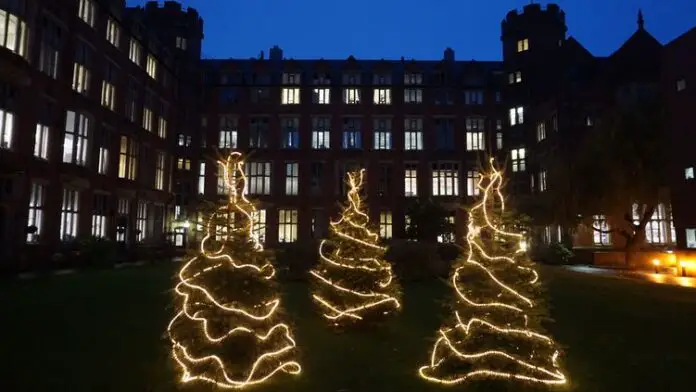Real Christmas trees may be a more eco-friendly option compared to artificial trees,if they are disposed of responsibly, new research has revealed.
A study comparing the sustainability of artificial versus real Christmas trees at Sheffield University, shows that a fake Christmas tree must be reused more than five times to lower its carbon emissions to less than those of a real tree.
Although many real trees (unless they are potted) are cut down for single use, they are a more sustainable option if recycled responsibly or composted as the environmental impact of manufacturing an artificial tree is significant.
The study, carried out by researchers at the University’s Grantham Centre for Sustainable Futures, has shed light on how thoughtful choices can reduce environmental impact during the festive season.
Dr Stuart Walker, Senior Research Fellow in Sustainability Assessment, considered a variety of factors related to the sustainability of Christmas trees. He identified two key factors that significantly influence the sustainability of our Christmas tree choices: the number of times a tree is reused and how it is ultimately disposed of.
Dr Stuart Walker, from the University of Sheffield, said: “As real trees grow, they take in carbon dioxide, storing it in their cells. Burning a tree therefore releases carbon dioxide rapidly and contributes to additional pollutants, such as particulate matter and soot.
“However, recycling or composting allows for a slower release of carbon and partial absorption into the soil, making these methods more sustainable. A potted Christmas tree has an ever-increasing climate benefit as it will continue to absorb carbon – as long as it is planted when it becomes too big for the pot.”
The research highlights that it is crucial to consider the end-of-life options for real Christmas trees to minimise their environmental impact. Sustainable methods, such as charity collection schemes, ensure that trees are properly recycled, composted, or replanted. In Sheffield, there are several Christmas tree charity donation schemes. This year, Sheffield Hospitals Charity and Bluebell Wood Children’s Hospice are both offering a collection and recycling scheme in exchange for a donation.
Dr Walker continues: “My research concludes that real trees are often the most sustainable choice, but only if disposed of thoughtfully. This underscores the importance of considering reuse, recycling, and sustainable alternatives in all aspects of life. Often the most sustainable choice is something you already own, so reusing an artificial tree as many times as possible reduces its environmental impact.”
This principle of reusing and reducing waste is echoed in other areas of research at the University of Sheffield. Professor Rachael Rothman, a plastics expert and co-director of the Grantham Centre, advocates for redefining single-use plastics to tackle global waste issues. She emphasises reducing plastic use, increasing reuse, and strengthening recycling systems rather than relying on exporting plastic waste. This holistic approach resonates with the need to minimise the impact of everyday choices, from our holiday traditions to the materials we use year-round.
Professor Rachael Rothman, Plastics Expert and Co-Director of the University of Sheffield’s Grantham Centre for Sustainable Futures, said: “Whether it’s a Christmas tree or the materials we use every day, reducing waste, reusing what we have, and recycling responsibly are small actions we can take that, collectively, can lead to impactful change.







